
Resources
Browse our full library of in-depth resources and publications
The PacWastePlus programme team is committed to producing meaningful and valuable publications and resources that provides guidance for improving waste management in the Pacific
Search
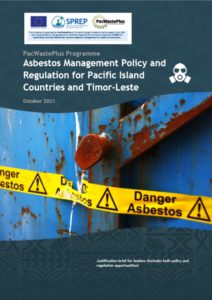
Booklet
Asbestos Management Policy and Regulation for Pacific Island Countries and Timor-Leste
Justification brief for leaders (includes both policy and regulation opportunities)
This document is designed to assist PacWastePlus participating countries to implement legislative instruments that ban the importation of asbestos and asbestos containing materials (ACMs).
This document provides:
• Introductory information on asbestos, its impacts on human health, and current management asbestos management practices
• Information on the regulatory, and non-regulatory activities that can be implemented to reduce exposure risk from asbestos and ACM
• Justification for executing an ACM ban both through policy and regulation.
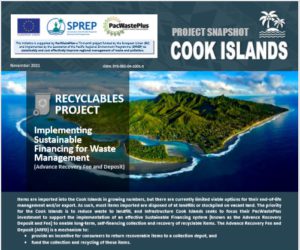
Factsheet
Cooks Island Project Profile – Implementing Sustainable Financing for Waste Management (Advance Recovery Fee and Deposit
Items are imported into the Cook Islands in growing numbers, but there are currently limited viable options for their end-of-life management and/or export. As such, most items imported are disposed of at landfills or stockpiled on vacant land. The priority for the Cook Islands is to reduce waste to landfill, and Infrastructure Cook Islands seeks to focus their PacWastePlus investment to support the implementation of an effective Sustainable Financing system (known as the Advance Recovery Deposit and Fee) to enable long-term, self-financing collection, and recovery of recyclable items. The Advance Recovery Fee and Deposit (ARFD) is a mechanism to • provide an incentive for consumers to return recoverable items to a collection depot, and • fund the collection and recycling of these item
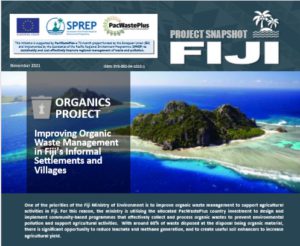
Factsheet
Fiji Project Profile – Improving Organic Waste Management in Fiji’s Informal Settlements and Villages
One of the priorities of the Fiji Ministry of Environment is to improve organic waste management to support agricultural activities in Fiji. For this reason, the ministry is utilising the allocated PacWastePlus country investment to design and implement community-based programmes that effectively collect and process organic wastes to prevent environmental pollution and support agricultural activities. With around 60% of waste disposed at the disposal being an organic material, there is a significant opportunity to reduce leachate and methane generation and to create useful soil enhancers to increase agricultural yield.
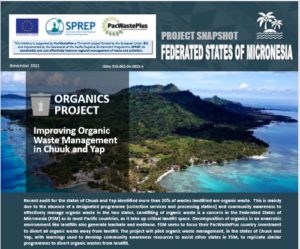
Factsheet
FSM Project Profile – Improving Organic Waste Management in Chuuk and Yap
A recent audit for the states of Chuuk and Yap identified more than 20% of the wastes landfilled is organic waste. This is mainly due to the absence of a designated programme (collection services and processing station) and community awareness to effectively manage organic waste in the two states. Landfilling of organic waste is a concern in the Federated States of Micronesia (FSM) as in most Pacific countries, as it takes up critical landfill space. Decomposition of organics in an anaerobic environment like landfills also generates leachate and methane. FSM seeks to focus their PacWastePlus country investment to divert all organic waste away from landfills. The project will pilot organic waste management, in the states of Chuuk and Yap, with learnings used to develop community awareness resources to assist other states in FSM, to replicate similar programmes to divert organic wastes from landfills.
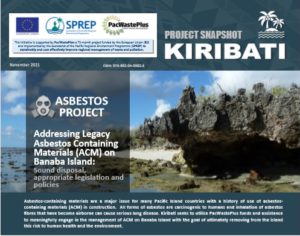
Factsheet
Kiribati Project Profile – Addressing Legacy Asbestos Containing Materials (ACM) on Banaba Island: Sound disposal, appropriate legislation and policies
Asbestos-containing materials are a major issue for many Pacific Island countries with a history of use of asbestos containing materials (ACM) in construction. All forms of asbestos are carcinogenic to humans and inhalation of asbestos fibres that have become airborne can cause serious lung disease. Kiribati seeks to utilise PacWastePlus funds and assistance to meaningfully engage in the management of ACM on Banaba Island with the goal of ultimately removed from the island this risk to human health and the environment.
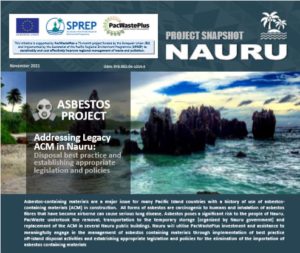
Factsheet
Nauru Project Profile – Addressing Legacy ACM: Disposal best practice and establishing appropriate legislation and policies
Asbestos-containing materials are a major issue for many Pacific Island countries with a history of use of asbestos containing materials (ACM) in construction. All forms of asbestos are carcinogenic to humans and inhalation of asbestos fibres that have become airborne can cause serious lung disease. Asbestos poses a significant risk to the people of Nauru. PacWaste undertook the removal, transportation to the temporary storage [organized by the Nauru government], and replacement of the ACM in several Nauru public buildings. Nauru will utilise PacWastePlus investment and assistance to meaningfully engage in the management of asbestos-containing materials through implementation of best practice off-island disposal activities and establishing appropriate legislation and policies for the elimination of the importation of asbestos containing materials
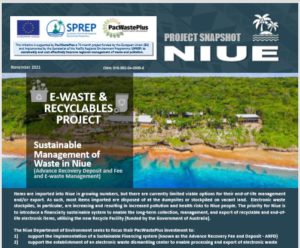
Factsheet
Niue Project Profile – Sustainable Management of Waste in Niue: Advance Recovery Deposit and Fee and E-waste Management
Items are imported into Niue in growing numbers, but there are currently limited viable options for their end-of-life management and/or export. As such, most items imported are disposed of at the dumpsites or stockpiled on vacant land. Electronic waste stockpiles, in particular, are increasing and resulting in increased pollution and health risks to Niue people. The priority for Niue is to introduce a financially sustainable system to enable the long-term collection, management, and export of recyclable and end-oflife electronic items, utilising the new Recycle Facility (funded by the Government of Australia).
The Niue Department of Environment seeks to focus their PacWastePlus investment to: 1) support the implementation of a Sustainable Financing system (known as the Advance Recovery Fee and Deposit - ARFD) 2) support the establishment of an electronic waste dismantling center to enable processing and export of electronic wast
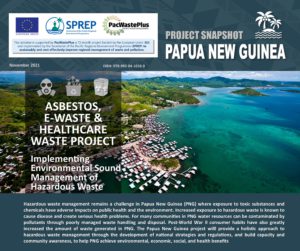
Factsheet
Papua New Guinea Project Profile – Implementing Environmental Sound Management of Hazardous Waste
Hazardous waste management remains a challenge in Papua New Guinea (PNG) where exposure to toxic substances and chemicals has adverse impacts on public health and the environment. Increased exposure to hazardous waste is known to cause disease and create serious health problems. For many communities in PNG, water resources can be contaminated by pollutants through poorly managed waste handling and disposal. Post-World War II consumer habits have also greatly increased the amount of waste generated in PNG. The Papua New Guinea project will provide a holistic approach to hazardous waste management through the development of national strategies and regulations, and build capacity and community awareness, to help PNG achieve environmental, economic, social, and health benefits.
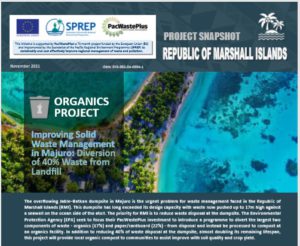
Factsheet
Republic of Marshall Islands Project Profile – Improving Solid Waste Management in Majuro: Diversion of 40% Waste from Landfill
The overflowing Jable–Batkan dumpsite in Majuro is an urgent problem for waste management faced in the Republic of Marshall Islands (RMI). This dumpsite has long exceeded its design capacity with waste now pushed up to 17m high against a seawall on the ocean side of the atoll. The priority for RMI is to reduce waste disposal at the dumpsite. The Environmental Protection Agency (EPA) seeks to focus their PacWastePlus investment to introduce a programme to divert the largest two components of waste - organics (17%) and paper/cardboard (22%) - from disposal and instead be processed to compost at an organics facility. In addition to reducing 40% of waste disposal at the dumpsite, almost doubling its remaining lifespan, this project will provide local organic compost to communities to assist improve with soil quality and crop yield.
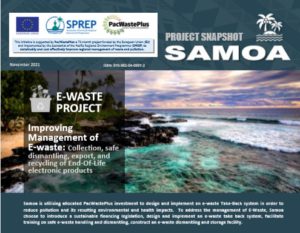
Factsheet
Samoa Project Profile – Improving Management of E-waste: Collection, safe dismantling, export, and recycling of End-Of-Life electronic products
Samoa is utilising allocated PacWastePlus investment to design and implement an e-waste Take-Back system in order to reduce pollution and its resulting environmental and health impacts. To address the management of E-Waste, Samoa chooses to introduce sustainable financing legislation, design and implement an e-waste take back system, facilitate training on safe e-waste handling and dismantling, construct an e-waste dismantling and storage facility.
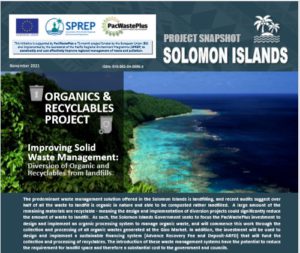
Factsheet
Solomon Islands Project Profile – Improving Solid Waste Management: Diversion of Organic and Recyclables from landfills
The predominant waste management solution offered in the Solomon Islands is landfilling, and recent audits suggest over half of all the waste to landfill is organic in nature and able to be composted rather than landfilled. A large amount of the remaining materials are recyclable - meaning the design and implementation of diversion projects could significantly reduce the amount of waste to landfills. As such, the Solomon Islands Government seeks to focus the PacWastePlus investment to design and implement an organic processing system to manage organic waste and will commence this work through the collection and processing of all organic wastes generated at the Gizo Market. In addition, the investment will be used to design and implement a sustainable financing system (Advance Recovery Fee and Deposit-ARFD) that will fund the collection and processing of recyclables. The introduction of these waste management systems has the potential to reduce the requirement for landfill space and therefore a substantial cost to the government and councils.
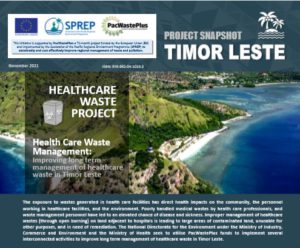
Factsheet
Timor Leste Project Profile – Health Care Waste Management: Improving long term management of healthcare waste
The exposure to wastes generated in health care facilities has direct health impacts on the community, the personnel working in healthcare facilities, and the environment. Poorly handled medical wastes by health care professionals, and waste management personnel have led to an elevated chance of disease and sickness. Improper management of healthcare wastes (through open burning) on land adjacent to hospitals leads to large areas of contaminated land, unusable for other purposes, and needing remediation. The National Directorate for the Environment under the Ministry of Industry, Commerce, and Environment and the Ministry of Health seeks to utilise PacWastePlus funds to implement several interconnected activities to improve long-term management of healthcare waste in Timor Leste.
Newsletter Subscription
Would you like to subscribe to our quarterly programme newsletter-The Connection?
We care about the protection of your data. Read our Privacy Policy.
Newsletter Signup
To sign up to our newsletter, enter the information below and we will add you to our mailing list for all future regional and project updates.
